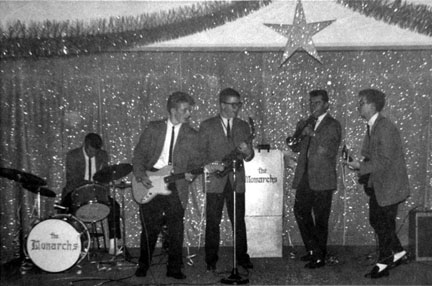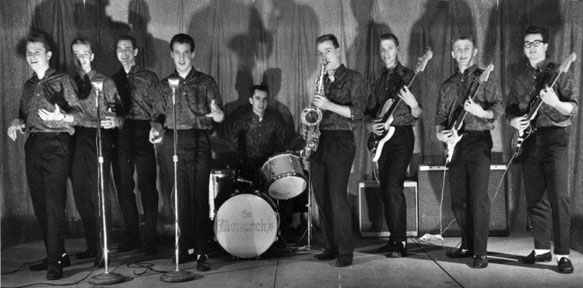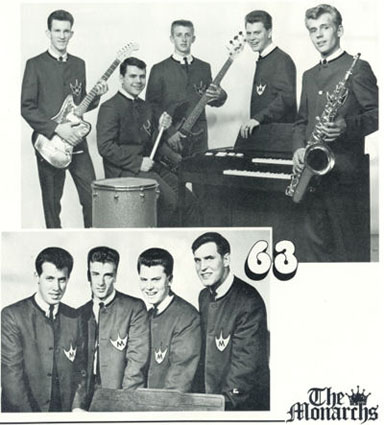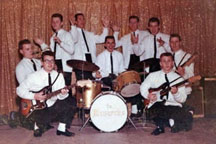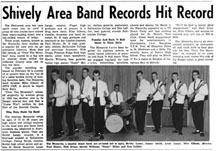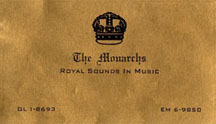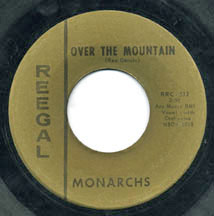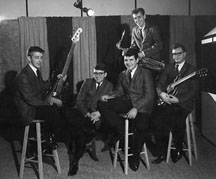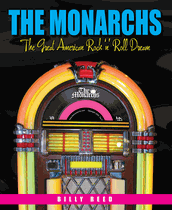About Us
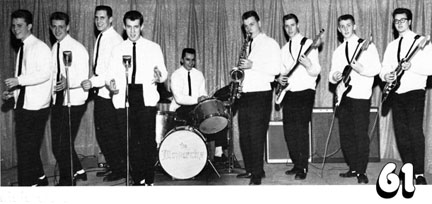
In the beginning
Their first professional engagement paid the entire nine-member band $20. Today they command more than 150 times that figure. They thought they had arrived when they bought the red '49 Packard ambulance to carry their equipment. Today it takes two 5-ton vans. The Monarchs have come a long way. In 1960, the Blue Angels, a 5-piece combo, contained the core of what would become The Monarchs. Following the addition of four members and a name change suggested by Frances Gibson, the mother of Mike Gibson the lead singer, the band scraped together the money to record their first 45.
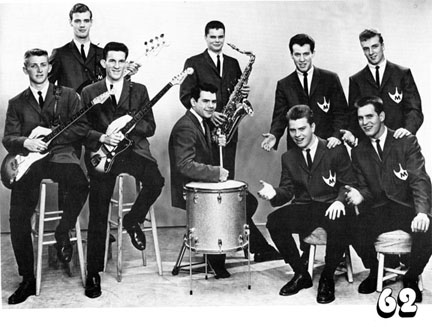
They were regulars at the FOP Hop in Okolona, the Middletown Hop, Gypsy Village at Fountaine Ferry Park, Ewing Lane Dance in Jeffersonville, In., and the weekly dance on the Belle Of Louisville. The band was booked into a regional circuit that included college fraternity and sorority dances, and clubs in Jasper, In. and Lebanon, Ky. The Monarchs became a favorite for debutante balls and were in constant demand from Indianapolis to Cincinnati.
These nine young men were able to appeal to both young and old. Their good looks, accompanied by their smooth treatment of a love ballad, fulfilled every young girl's dream. At the same time, their clean cut appearance and squeaky-clean reputation satisfied even the strictest parent's image of the "boy next door."
In 1964, The Monarchs chose to record a song that would allow them to fully explore the rich harmonies of the four vocalists and feature Mike Gibson's falsetto, the trademark for the band. The song was, "Look Homeward Angel." The recording session took place in Owen Bradley's Recording Studio in Nashville, Tennessee and it included several other Louisville musicians. Innovative for the time, The Monarchs achieved their desired sound by vocal overdubbing and the addition of instruments commonly used in a full orchestra. This single shot to #1 on the local and regional charts and caught the attention of the national music scene. "Look Homeward Angel" remained on the national Billboard charts for thirteen weeks and went all the way to #47.
The Monarchs had notched a place for themselves in Louisville's music history. The demand for the band became even more accelerated and they went "on the road."
The Monarchs traveled all along the East Coast, playing at every event from teen dances to grand openings for shopping centers. They appeared on radio and TV shows, such as the Bob Braun Show. Each appearance earned them invaluable experience and won them new fans. The travel was paying off. "Look Homeward Angel" went to #1 in 17 major markets and was breaking into the Top 10 throughout the country.
The Monarchs appeared in concert with some of the biggest national performers of the time including Del Shannon, Jay and the Americans, the Beach Boys and Glen Campbell, Bo Diddley, Johnny Tillotson and Dee Dee Sharp.
The Monarchs' follow-up record, "Climb Every Mountain," did well on the regional level reaching #13 on the charts. But, just as the current sound in music had begun to change with the British invasion, the band members' lives had begun to change. They were a little older now, other demands had to take priority and their music careers were slowly moved to the back burner. Many American groups gave in to the British influence and changed their sound. The Monarchs fought to maintain their harmonious quartet style but around 1967 members began to leave the band in order to pursue professional careers. College and the military took some; marriage and children demanded more time be spent at home. For a brief period other personnel performed using The Monarchs' name but by the late sixties, The Monarchs had faded into the grown-up world of 9 to 5 jobs and mortgage payments.
Their time of innocence was over but each member had something that no amount of hum-drum daily living could ever take away. They were THE MONARCHS.

